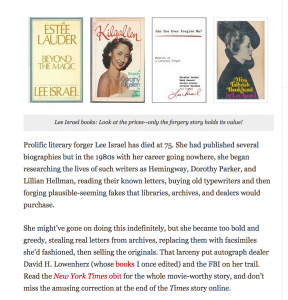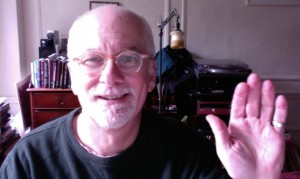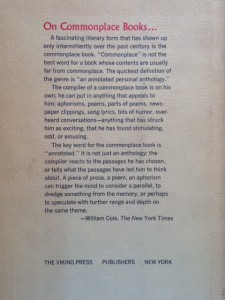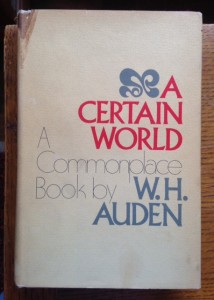JANUARY 2016 UPDATE: Readers of this blog may recall my connection to The Revenant: A Novel of Revenge, mentioned on this site a year ago in the post below, after I learned the book, originally published in 2002, was about to be reissued by a new publisher, the basis of a major motion picture. I saw the movie last weekend, and found it quite engrossing, even at more than 2 1/2 hours duration. The cinematography is exceptional, the acting quite believable, and the storytelling very powerful. I recall that author Michael Punke was already then having discussions about possible film adaptations, since the Glass story had already once been filmed, as “Man in the Wilderness,” with Richard Harris and John Huston in 1971. Even so, over the years no film resulted, that until word came last year of the cinematic collaboration between Alejandro Gonzalez Inarritu’s and Leonardo DiCaprio’s. As the credits rolled following the film last weekend, I saw that the production of course credited the book, though with a proviso I’d not seen before, stating that the movie was “Based in Part on the Novel by Michael Punke.” I imagine the wording was mutually agreed to between the author’s agent and the producers, because the two works do diverge. But I don’t criticize the filmmakers on that score, for as Punke himself wrote in an Historical Note at the end of the novel, the confirmed history surrounding Hugh Glass’s life is scant—little more is known for certain beyond the fact he lived, was a skilled tracker, was mauled by a grizzly bear during an 1823 expedition with the Rocky Mountain Fur Trading Company, following which he was left for dead by two of his likely companions, a miscreant named John Fitzgerald and a teenaged Jim Bridger; Bridger ultimately became a much more famous mountain man than Glass, with modern tourist sites in the Mountain West named after him. I’m pleased to see the movie is bringing more attention to the gripping novel, which is a bestseller in the Picador reissue. I’m also pleased to remind people about the book, since as the Obama administration’s Deputy Trade Representative to the WTO in Geneva, Switzerland, Michael Punke is not permitted to directly promote his own commercial interests. I’m happy to stand in for him, then, as relatives of his have been doing at premieres of the movie, which has now garnered many Academy Award nominations.
When I was a retail bookseller with Undercover Books, this is exactly the sort of novel that we would read in advance galleys from the publisher, then order 50 copies, and sell them all in the book’s first month on sale. If you enjoy adventure tales, I recommend you read this one, a gripping survival story based on the life of a real American who traverses a great swath of the inter-mountain west in a quest for justice, less than 20 years after the Lewis and Clark Expedition had opened the region to exploration.
—
January 2015nant-front.jpg”>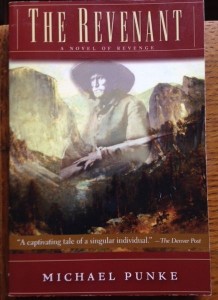 the BN Review recently I was delighted to discover that one of the most engrossing novels I ever edited and published—The Revenant: A Novel of Revenge—has been reissued and is being made in to a major movie starring Leonardo DiCaprio, directed by Alejandro Gonzalez Inarritu, who recently directed “Birdman.” The novel, by Michael Punke, was published in 2002, when I was an editorial executive at Carroll & Graf. It’s inspired by the epic life and adventures of a historical figure, Hugh Glass. He was a frontiersman and fur trapper who in 1823 was part of a westward expedition spanning what is today Nebraska, the Dakotas, Montana, and Wyoming. While foraging for game, away from the troop, Glass was attacked and severely mauled by a grizzly bear. Grievously wounded and bleeding, with the skin on his back nearly flayed off his torso, Glass was still conscious when his comrades found him. Believing that Glass would surely die soon, the leader of the troop ordered two men to stay with him until he expired, then bury him and catch up to the group. In the midst of this death watch, a band of Indians approached the camp, panicking the two men: they grabbed Glass’s rifle and hunting knife and fled. Deserted, defenseless, and enraged at being abandoned, Glass refuses to succumb to his wounds; he survives, determined to recover his weapons, vowing revenge on the men who left him to die. The novel is beautifully written and reads like a timeless adventure story. Talk about a film adaptation of the novel began years ago, and I’m delighted to see now it’s really happening, and with such a high profile team. Hugh Glass did inspire one earlier film, in 1971, when actor Richard Harris was cast as the Glass figure in “Man in the Wilderness,” a rather lurid and unexceptional movie. Punke’s telling of this epic saga, with Glass crawling and dragging himself across wild terrain until he was again able to walk, has all the elements for a great movie and I’m hopeful that is what the production will lead to.
the BN Review recently I was delighted to discover that one of the most engrossing novels I ever edited and published—The Revenant: A Novel of Revenge—has been reissued and is being made in to a major movie starring Leonardo DiCaprio, directed by Alejandro Gonzalez Inarritu, who recently directed “Birdman.” The novel, by Michael Punke, was published in 2002, when I was an editorial executive at Carroll & Graf. It’s inspired by the epic life and adventures of a historical figure, Hugh Glass. He was a frontiersman and fur trapper who in 1823 was part of a westward expedition spanning what is today Nebraska, the Dakotas, Montana, and Wyoming. While foraging for game, away from the troop, Glass was attacked and severely mauled by a grizzly bear. Grievously wounded and bleeding, with the skin on his back nearly flayed off his torso, Glass was still conscious when his comrades found him. Believing that Glass would surely die soon, the leader of the troop ordered two men to stay with him until he expired, then bury him and catch up to the group. In the midst of this death watch, a band of Indians approached the camp, panicking the two men: they grabbed Glass’s rifle and hunting knife and fled. Deserted, defenseless, and enraged at being abandoned, Glass refuses to succumb to his wounds; he survives, determined to recover his weapons, vowing revenge on the men who left him to die. The novel is beautifully written and reads like a timeless adventure story. Talk about a film adaptation of the novel began years ago, and I’m delighted to see now it’s really happening, and with such a high profile team. Hugh Glass did inspire one earlier film, in 1971, when actor Richard Harris was cast as the Glass figure in “Man in the Wilderness,” a rather lurid and unexceptional movie. Punke’s telling of this epic saga, with Glass crawling and dragging himself across wild terrain until he was again able to walk, has all the elements for a great movie and I’m hopeful that is what the production will lead to.
Punke’s agent Tina Bennett submitted the manuscript to me soon after 9/11, an event and aftermath that I was close to, as the offices of Carroll & Graf and Avalon Publishing Group were only a few blocks from the World Trade Center. As I chronicled on this blog on Sept 11, 2012, in a post titled Remembering 9/11/01—Running Through a Dust Cloud in Lower Manhattan, the exertions of that day left me with nagging leg injuries that persisted for most of the year that followed. In fact, when I attended the book launch for The Revenant, held in Washington, DC, in the summer of 2002, I took the train from NYC using a cane to help me walk on a still-tender ankle.
Though novels don’t often have subtitles or reading lines, I suggested to the author that we use one here. We had quite an evocative title, though the word ‘revenant’ (a being that returns from the dead) was not then and still isn’t a widely familiar term. Glass’s odyssey seeking revenge and justice resonated powerfully with the spirit of the time, so “A Novel of Revenge” seemed the right way to position the book for readers. The publisher reissuing the book now is Picador, part of Macmillan, and I’m glad to see in online listings they’ve chosen to retain the reading line. Interestingly, they’ve reissued the novel in hardcover, not paperback, a somewhat unusual choice for a book published more than a decade ago, though perhaps a sign of the publisher’s confidence in its continuing relevance.
Michael Punke has written two nonfiction books in the years since 2002, both in Western history, Fire and Brimstone: The North Butte Mining Disaster of 1917 and Last Stand: George Bird Grinnell, the Battle to Save the Buffalo, and the Birth of the New West. The book launch for The Revenant was in DC because Punke worked for a law firm there. Among the hosts at the party was a mentor and colleague to Punke, Mickey Kantor, a lawyer involved in international trade who’d served as chair of the Clinton campaign for president in 1992. Punke now works as President Obama’s Deputy United States Trade Representative and US Ambassador to the World Trade Organization in Geneva, Switzerland. According to this article in Maxim, his ability to engage in promoting his books is very limited by his sensitive position in the federal government. I’m very glad to know that Michael Punke’s first book is coming back in to print, and that a movie is in the works. We have been in touch occasionally over the past decade, and I’m pleased that I have so much good news to congratulate him about when we’re next in touch. Above is the front and below the back cover of the paperback edition of The Revenant from 2003.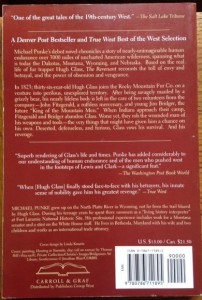

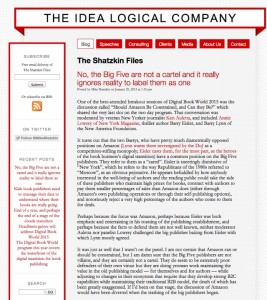
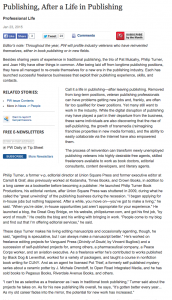
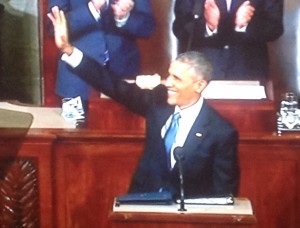

 the
the 
